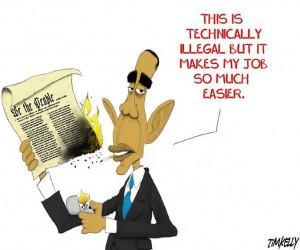Special to WorldTribune.com
Pundits are pointing to President Barack Obama’s recent decline in public opinion polls, and saying that he may now become another “lame duck” president, unable to accomplish much during his final term in office.
That has happened to other presidents. But it is extremely unlikely to happen to this president. There are reasons why other presidents have become impotent during their last years in office. But those reasons do not apply to Barack Obama.
 The Constitution of the United States does not give presidents the power to carry out major policy changes without the cooperation of other branches of government. Once the country becomes disenchanted with a president during his second term, Congress has little incentive to cooperate with him — and, once Congress becomes uncooperative, there is little that a president can do on his own.
The Constitution of the United States does not give presidents the power to carry out major policy changes without the cooperation of other branches of government. Once the country becomes disenchanted with a president during his second term, Congress has little incentive to cooperate with him — and, once Congress becomes uncooperative, there is little that a president can do on his own.
That is, if he respects the Constitution.
President Obama has demonstrated, time and again, that he has no respect for the Constitution’s limitations on his power. Despite his oath of office, to see that the laws are faithfully executed, Barack Obama has unilaterally changed welfare reform laws, by eliminating the work requirement passed by Congress during the Clinton administration.
He has repeatedly and unilaterally changed or waived provisions of the Obamacare law passed by Congress during his own administration.
President Obama has ordered Border Patrol agents not to carry out provisions of the immigration laws that he does not like. We see the results today in the tens of thousands of illegal immigrants entering the country unimpeded.
President Obama’s oath of office obviously means no more to him than his oft-repeated promise that “you can keep your own doctor” under Obamacare.
Why do we have a Constitution of the United States if a president can ignore it without any consequences?
The Constitution cannot protect our rights if we do not protect the Constitution. Freedom is not free, and the Constitution is just some words on paper if we do not do anything to those who violate it.
What can ordinary citizens do?
Everything! Theirs is the ultimate power of the ballot that can bring down even the most powerful elected official.
The most important thing the voters can do is vote against anyone who violates the Constitution. When someone who has violated the Constitution repeatedly gets re-elected, then the voters are accomplices in the erosion of protection for their own freedom.
Laws without penalties are just suggestions — and suggestions are a pitiful defense against power.
After voters have failed to protect the Constitution, the last-ditch remedy is impeachment. But Barack Obama knows that he is not going to be impeached.
Who wants to provoke a Constitutional crisis and riots in the streets? And, worst of all, end up with Joe Biden as President of the United States? Some cynics long ago referred to Barack Obama’s choice of mental lightweight Biden to be his vice president as “impeachment insurance.”
With neither the Constitution, nor the voters, nor the threat of impeachment to stop him, Barack Obama has clear sailing to use his powers however he chooses.
Far from seeing his power diminish in his last years, President Obama can extend his power even beyond the end of his administration by appointing federal judges who share his disregard of the Constitution and can enact his far-left agenda into law from the bench, when it cannot be enacted into law by the Congress.
Federal judges with lifetime tenure can make irreversible decisions binding future presidents and future Congresses. If Republicans do not win control of the Senate in this fall’s elections, a Senate controlled by Majority Leader Harry Reid can confirm judges who will have the power to extend Barack Obama’s agenda and complete the dismantling of Constitutional government.
Barack Obama can, as he said before taking office, fundamentally “change the United States of America.” Far from being a lame duck president, Obama can make this a lame duck democracy.
Thomas Sowell is a senior fellow at the Hoover Institution, Stanford University.

You must be logged in to post a comment Login